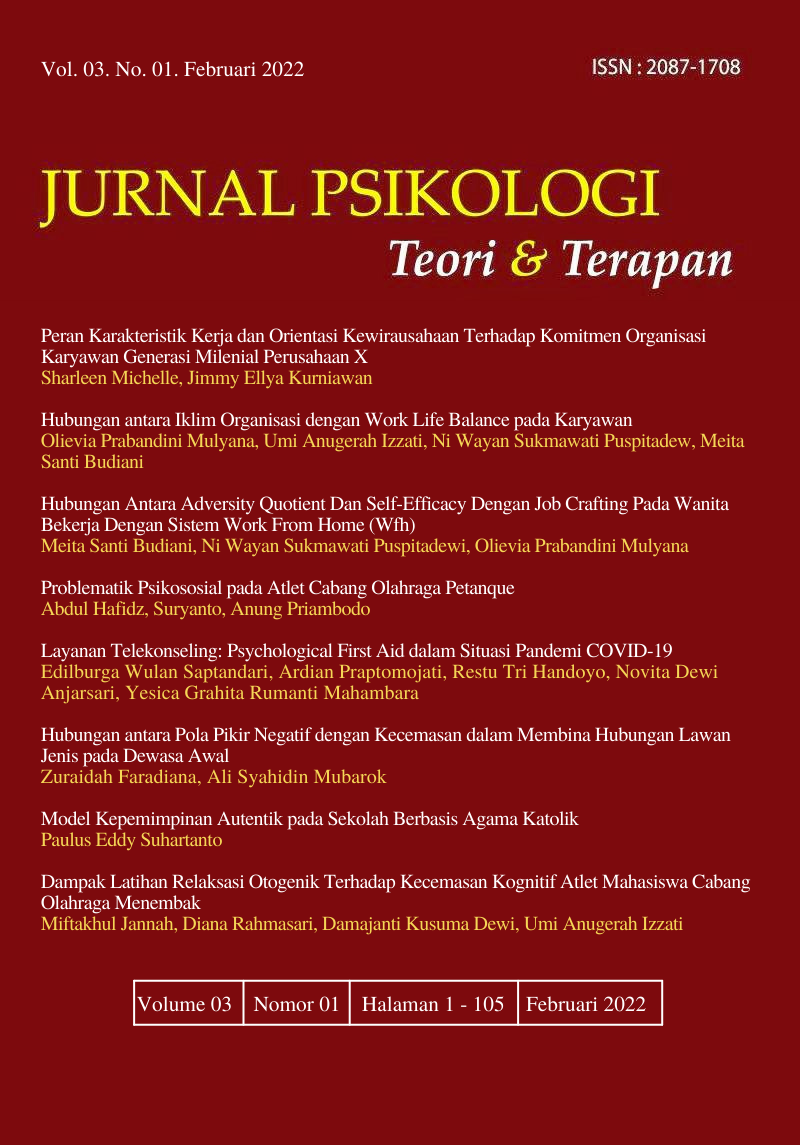Dampak Latihan Relaksasi Otogenik Terhadap Kecemasan Kognitif Atlet Mahasiswa Cabang Olahraga Menembak
DOI:
https://doi.org/10.26740/jptt.v13n1.p94-105Keywords:
Relaksasi otogenik, kecemasan kognitif, menembak , atlet mahasiswa, latihan mentalAbstract
Abstract: This research has a background on the importance of mental aspects as a supporter of performance achievement in shooting student athletes. One of the influential mental aspects was cognitive anxiety needed reduced by mental training. Autogenic relaxation can be applied to reduce cognitive anxiety. The aim of this research was to knowing the effect of autogenic relaxation training on reducing cognitive anxiety among shooting student athletes. An experimental approach with pretest-posttest control group design was used for 6 times in this ressearch. A total of 12 (6 male, 6 female) shooting student athletes were involved in this study. Age range 19-23 years old. Data obtained through cognitive anxiety scale. Independent t test was used as a data analysis technique. The results of the research show that the t value is -8.374 with p < 0.001. This shows that autogenic relaxation training effective to reduce shooting student athlete’s cognitive anxiety. The decrease of cognitive anxiety occurred partly due to the athlete's acceptance of the importance of mental training. In addition, autogenic relaxation mechanisms lead to specific responses against cognitive anxiety symptoms. Relaxation is characterized by physiological adjustments that are caused without any tension in the mind and body. As a result, anxiety is distracted so that it decreases. Autogenic relaxation can be used as an intervention for shooting student athletes to reduce their cognitive anxiety.
Key words: Autogenic relaxation, anxiety, shooting, athlete, mental training.
Abstrak: Penelitian ini memiliki latar belakang pentingnya aspek mental sebagai pendukung pencapaian performa pada atlet mahasiswa cabang olahraga menembak. Salah satu aspek mental yang berpengaruh adalah kecemasan kognitif. Salah satu intervensi yang dapat dilakukan untuk menurunkan kecemasan kognitif yaitu melalui latihan relaksasi otogenik. Penelitian ini memiliki tujuan untuk mengetahui dampak latihan relaksasi otogenik terhadap penurunan kecemasan kognitif pada atlet mahasiswa cabang olahraga menembak. Pendekatan eksperimen melalui desain pretest-posttest control group diterapkan pada penelitian ini. Eksperimen dilakukan selama 6 kali. Sejumlah 12 orang (6 laki-laki, 6 perempuan) atlet mahasiswa cabang olahraga menembak terlibat dalam penelitian ini. Rentang usia 19 – 23 tahun. Data diperoleh melalui skala kecemasan kognitif saat sebelum dan sesudah perlakuan relaksasi otogenik. Uji t independent digunakan sebagai teknik analisis data. Hasil riset menunjukkan bahwa nilai t sebesar -8,374 dengan p < 0,001. Ini menunjukkan bahwa latihan relaksasi otogenik berdampak pada penurunan kecemasan kognitif pada atlet mahaasiswa cabang olahraga menembak. Penurunan kecemasan kognitif terjadi antara lain disebabkan oleh adanya hasil fase edukasi akan pentingnya latihan mental bagi atlet mahasiswa cabang olahraga menembak. Selain itu, mekanisme relaksasi otogenik mengarah pada respon spesifik melawan gejala kecemasan kognitif. Relaksasi ditandai penyesuaian fisiologis dan pikiran. Dampaknya kecemasan kognitif terurai ssehingga terjadi penurunan. Relaksasi otogenik dapat dijadikan salah satu intervensi bagi atlet mahasiswa cabang olahraga menembak untuk menurunkan kecemasan kognitif yang dialaminya.
Kata kunci: Relaksasi otogenik, kecemasan kognitif, menembak, atlet mahasiswa, latihan mental.
References
Jannah, M. (2016). Psikologi Eksperimen. Unesa University Press.
Jannah, M. (2017). Seri Pelatihan Mental Olahraga: Konsentrasi. Unesa University Press.
Jannah, M. (2019). Kecemasan Olahraga: teori, pengukuran, dan latihan mental. Unesa University Press.
Jannah, M., & Widohardhono, R. (2020). Mental Skill Training Untuk Atlet. CV AA Rizky.
Jannah, M., Rahmasari, D., Dewi, D.K., Izzati, U.A. (2021), Dapatkah Relaksasi Otogenik Menurunkan Kecemasan Atlet Menembak ?, Journal of Psychological Perspective, 3(2), 91-96. https://doi.org/10.47679/jopp.321502021
Mattle, S., Birrer, D. & Elfering, A. (2020) Feasibility of Hypnosis on Performance in Air Rifle Shooting Competition. International Journal Of Clinical And Experimental Hypnosis, ,1-9. https://doi.org/10.1080/00207144.2020.1799655
Rachmaningdiah, E. N., & Jannah, M. (2016). Pengaruh Pelatihan Otogenik Terhadap Penurunan Kecemasan Atlet Bulutangkis. Jurnal Psikologi Teori Dan Terapan, 6(2), 107. https://doi.org/10.26740/jptt.v6n2.p107-112
Schinke, R. (2011). Introduction to sport psychology: training, competition and coping (Robert Schinke, Ed.). Nova Science Publishers, Inc.
Terry, P. C., Bertollo, M., & Filho, E. (2020). Advancements in mental skills training. In Advancements in Mental Skills Training. https://doi.org/10.4324/9780429025112-1
Downloads
Published
How to Cite
Issue
Section
License
Copyright (c) 2022 Jurnal Psikologi Teori dan Terapan

This work is licensed under a Creative Commons Attribution-NonCommercial 4.0 International License.
Authors who publish in this journal agree to the following terms:
Copyright in any article is held by the author.
The author grants the journal, publication rights with the work simultaneously licensed under a Creative Commons Attribution License that allows others to share the work with an acknowledgment of the work's authorship and initial publication in this journal.
Authors may enter into separate, additional contractual arrangements for the non-exclusive distribution of the journal's published version of the work (e.g., posting it to an institutional repository or publishing it in a book), with an acknowledgment of its initial publication in this journal.
Authors are permitted and encouraged to post their work online (e.g., in an institutional repository or on their website) prior to and during the submission process, as this can lead to productive exchanges, as well as earlier and greater citation of published work.
 Abstract views: 1815
,
Abstract views: 1815
, PDF Downloads: 1528
PDF Downloads: 1528


















